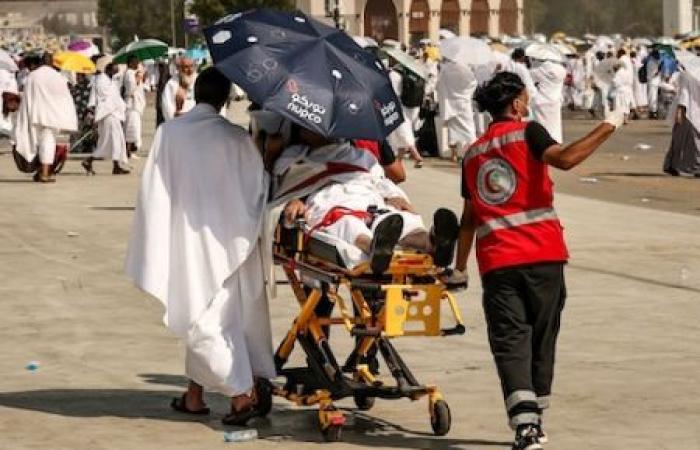(Agence Ecofin) – This week in health news in Africa, the resurgence of Covid-19 following the pilgrimage to Mecca is attracting the attention of the authorities, particularly in Senegal, Ivory Coast and Cameroon. At the same time, vigilance remains required in the face of the continued spread of other infectious and viral diseases, such as mpox and dengue fever.
In West Africa, cases of Covid-19 brought back from Hajj
This week, there has been a resurgence of Covid-19 cases in several West African countries, following the pilgrimage to Mecca. This increase in cases comes against the backdrop of a global resurgence of Covid-19. Investigations are underway to determine the strains concerned.
In Senegal, upon their return from the Holy Places of Islam, pilgrims show coronavirus positivity rates varying between 20% and 60%, depending on the flights. This was revealed by Charles Bernard Sagna, head doctor of the health control service at Blaise Diagne International Airport (AIBD). The situation, naturally, worries health authorities who are calling for vigilance. Under these conditions, Mr. Sagna stressed the importance for pilgrims to continue to wear masks, both on board planes and upon their return to Senegal, in order to prevent the spread of the virus. Strict preventive measures are in place, including systematic screenings and reinforced medical monitoring to contain any possible epidemic outbreak. Pilgrims with symptoms are also encouraged to consult quickly and get tested, with the aim of limiting community transmission. .
In Ivory Coast, there are at least 25 cases among 619 travelers tested by the Ministry of Health. This being said, the authorities indicate that the rate remains controllable, while positive subjects are isolated and monitored following the health protocols in force. In the process, the supervisory ministry urges the population to be systematically tested in the event of symptoms (such as fever, cough and breathing difficulties) and to strictly respect preventive measures such as wearing a mask and washing their hands.
In Cameroon, The supervisory ministry announces the reactivation of strict measures at the borders and in hospitals across the country. According to a press release published on June 26, Minister Malachie Manaouda stressed the importance of preventing the spread of the virus on the national territory. Thus, travelers entering through the country’s international airports must now fill out identification forms to facilitate health monitoring. Passengers, including those returning from the 2024 Hajj in Saudi Arabia, are subject to systematic testing upon arrival. Emergency and consultation services are mobilized to detect and isolate suspected cases, while patients who test positive benefit from free medical care. These measures come a few months after the lifting of border restrictions against Covid-19 in June 2023.
Covid-19 Pandemic: Impact on Infectious Diseases
In connection with Covid-19, a publication by Airfinity and Bloomberg notes that at least 13 infectious diseases have seen their incidence increase since the start of the Covid-19 pandemic. Among these, measles, whooping cough, tuberculosis, dengue fever, cholera and polio are among the most worrying. Diseases that are particularly active in the sub-Saharan zone.
More than 40 countries are reporting a significant resurgence of these diseases, often attributed to three main factors. First, the decline in vaccination rates, particularly in Europe where several countries have seen their levels fall below critical thresholds, is favoring these epidemic outbreaks. Then, the decline in overall immunity following health restrictions linked to Covid-19 made populations more vulnerable to pathogens. Finally, climate change contributes to the spread of diseases such as dengue fever, facilitated by the migration of mosquitoes to new areas.
Togo: proactive response against dengue fever
In Togo, it is the epidemic of dengue fever, a hemorrhagic viral disease underway for several months in the sub-region, which is making headlines. According to health authorities, during the second quarter of 2024, investigations were intensified to detect cases early through health facilities and the community. Symptoms include fever, weakness, headache and muscle pain, requiring increased vigilance.
The Ministry of Health and Public Hygiene has responded by strengthening early detection, patient management and awareness raising on preventive measures. Among these, the use of impregnated mosquito nets and the elimination of larval breeding sites are crucial to reduce the risk of transmission. Active community collaboration is also called for to contain the spread of this preventable disease with adequate management.
DRC: Increased risks of spread of monkeypox
The World Health Organization (WHO) is sounding the alarm over the spread of monkeypox in the Democratic Republic of Congo (DRC). With 9,291 clinically compatible cases and 419 deaths reported in 2024, the situation remains critical, especially among children, who are particularly vulnerable to this viral disease with a high case fatality rate of nearly 5%.
A new strain of the virus, clade I, has recently spread to South Kivu and Goma, increasing the risks of more widespread outbreaks. WHO’s Rosamund Lewis highlights the urgency of a coordinated international response to contain this outbreak, warning of continued challenges from limited global immunity.
At the same time, another strain, clade IIb, is affecting South Africa, exacerbating the risks for patients with advanced HIV. WHO stresses the need to intensify vaccination and surveillance efforts to control this alarming resurgence of monkeypox in Africa.
Ayi Renaud Dossavi
Read also:






